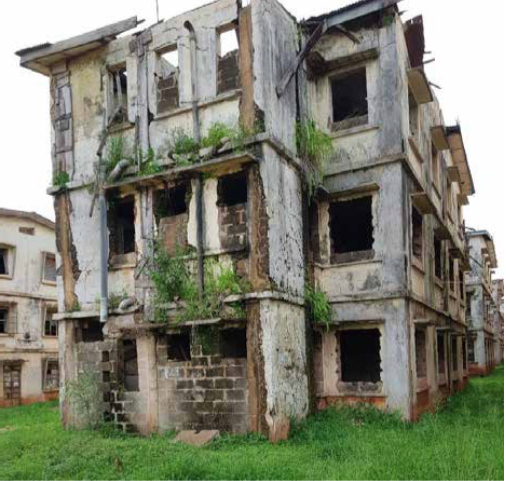Paucity of funds, high cost of materials, conflicts adduced for project delay
No fewer than 18,663 housing units belonging to the Lagos State government, which construction started over five years ago, are lying fallow at various sites in the metropolis.
According to New Telegraph’s investigation, some of these housing units, which cut across three senatorial districts, were either being executed directly by government or through joint ventures with the private sector.
It was further gathered that the housing estates were abandoned due to paucity of fund, conflicts and political issues, despite huge accommodation deficit in the state.
The housing units and their locations are the Chois Estate Agbowa – 400 units; Egan scheme -684 units; Igbogbo 11b -360 units; Odo onosa /Ayandelu -660 units; Sangotedo in Eti Osa 2 phases -1188 units and Ajara estate -420 units.
Those under joint ventures scheme encompass Ijora Badia- 771 units; Iponri Estate, Surulere -132 units; Imota, Ayobo, Idale -2000 units; Ilamoye,Abijo -2464 units; Tolu Ajegunle, Abule Ado -2126; Ikota Ogombo -3300; Ibeshe Owutu -3000; Igbogbo JV scheme -416 units and Ilubirin – 472 housing units.
Contracts for some of the housing projects were awarded between five and eight years ago by past administrators in the state.
Perturbed by the huge abandonment, the Commissioner of Housing in the state, Morouf Akinderu-Fatai, has ordered all the contractors and developers back to sites.
He charged the contract partners and private investors to ensure completion of all housing schemes, which have been contracted to them within the scheduled timeframe.
The commissioner lamented the breach of contract schedule by private partners, saying that was responsible for uncompleted housing schemes in the state.
Akinderu-Fatai described the breach by private nvestors and joint partners as unfortunate to government’s effort to address housing deficit, which is a challenge that require urgent attention.
Speaking on the effort so far, he said: “We are resuscitating some abandoned projects like Egan housing scheme and revisiting some joint ventures for compliance and quick completion of projects.”
According to him, the state government had witnessed the completion of 492 homes in Lateef Jakande Gardens in Igando, adding that Igbogbo and Sangotedo schemes are nearing completion.
Apart from working hard to deliver ongoing projects within the next 24 months, the commissioner disclosed that government was planning to initiate new schemes in all parts of the state.
Beyond this, he said there were solid plans to turn around some of the dilapidated estates in the state into liveable cities to achieve the SDG 11 of sustainable and liveable cities.
“We are geared towards making more Lagosians home owners. We are also looking into transit homes for those in emergency situations to reduce homelessness and destitution,” he said.
The commissioner for housing listed high costs of building materials and labour as well as funding issue as some of the factors militating against affordable housing in the state.
According to him, solution to land matters is having a synergy between government ministries, departments and agencies (MDAs) connected with land matters.
He stated that the ministry now had good relationship with the lands bureau, saying that many opportunities were opening up in Lekki and Epe areas.
To overcome the challenges posed by high cost of materials and labour, he disclosed that government would be sponsoring researches into development of technology that will reduce cost of building.
“We will also build human capacity with training programmes for artisans both to reduce unemployment and bring down cost of labour,” he said.
The commissioner pointed out that building was a highly capital-intensive project, saying that was the main reason government involved private partners in many of the housing projects.
He said: “We are also actively looking for cheap funds to translate our visions into reality.
“We are also opening a portal for greater relationships between government and operators and investors in estate development for the purpose of transparency and collaboration in the interest of the citizenry of the state.”

On mortgage finance, he said this depended on citizens having sustainable income over a period of time.
According to him, Lagos State Government, apart from working on reducing mortgage interest to the minimum on its own houses, is also promoting an environment that is conducive for increased economic activities so that people could meet the basic requirements of mortgage.
Lagos, Nigeria’s commercial capital, is home to 21 million people. It currently has a housing deficit of about three million.
Source: newtelegraphng




